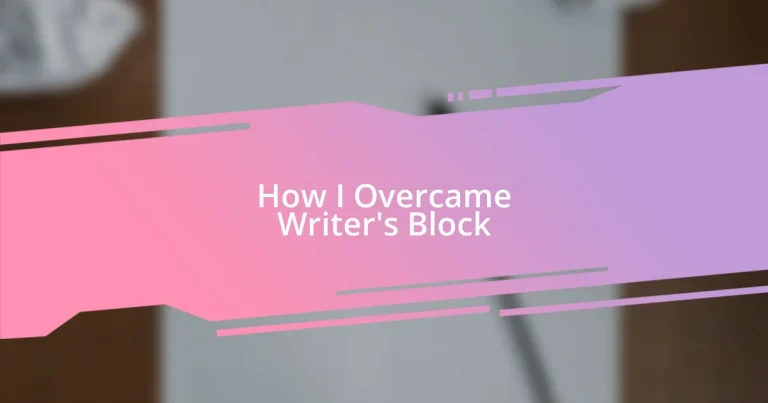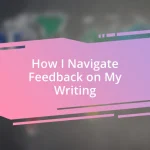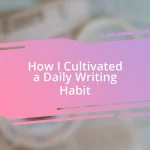Key takeaways:
- Acknowledging and understanding personal triggers, such as emotional states and environmental factors, is essential for overcoming writer’s block.
- Establishing a consistent writing routine and engaging in creativity exercises, like freewriting and mind mapping, can significantly enhance creative flow.
- Seeking feedback and support from others, whether through communities or one-on-one discussions, fosters growth and perspective in the writing process.
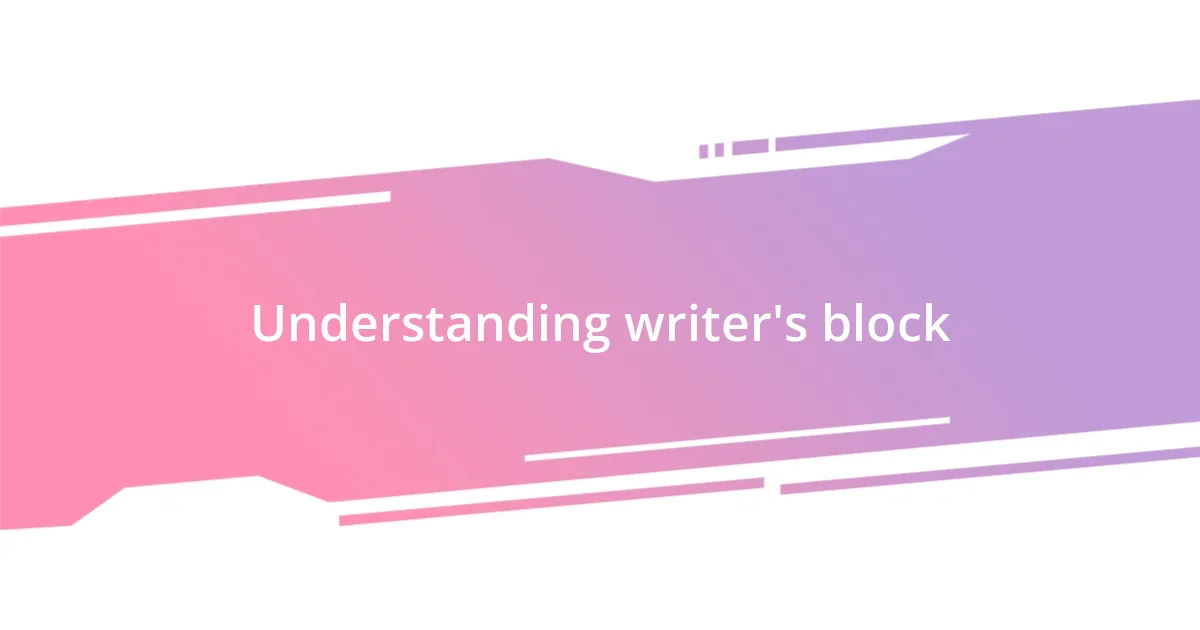
Understanding writer’s block
Writer’s block can feel like an invisible barrier, halting the flow of creativity just when you need it most. I remember staring at a blank screen for hours, feeling frustration bubbling up inside me. It’s that all-too-familiar sensation where your mind races, but the words simply refuse to appear. Have you ever felt that paralyzing grip when you know exactly what you want to say, yet nothing comes out?
Understanding the root causes of writer’s block is crucial. For me, acknowledging the pressure of expectations—both self-imposed and external—was a game-changer. It’s so easy to get caught up in wanting everything to be perfect, isn’t it? When I realized that imperfection is part of my creative process, those daunting walls started to crumble.
Sometimes, writer’s block can stem from deeper emotional currents. I recall a time when a particularly stressful life event clouded my mind; it was hard to tap into my usual well of creativity. Have you considered how your emotional state might be affecting your writing? Understanding these connections can be enlightening and might just help you find your way back to the page.
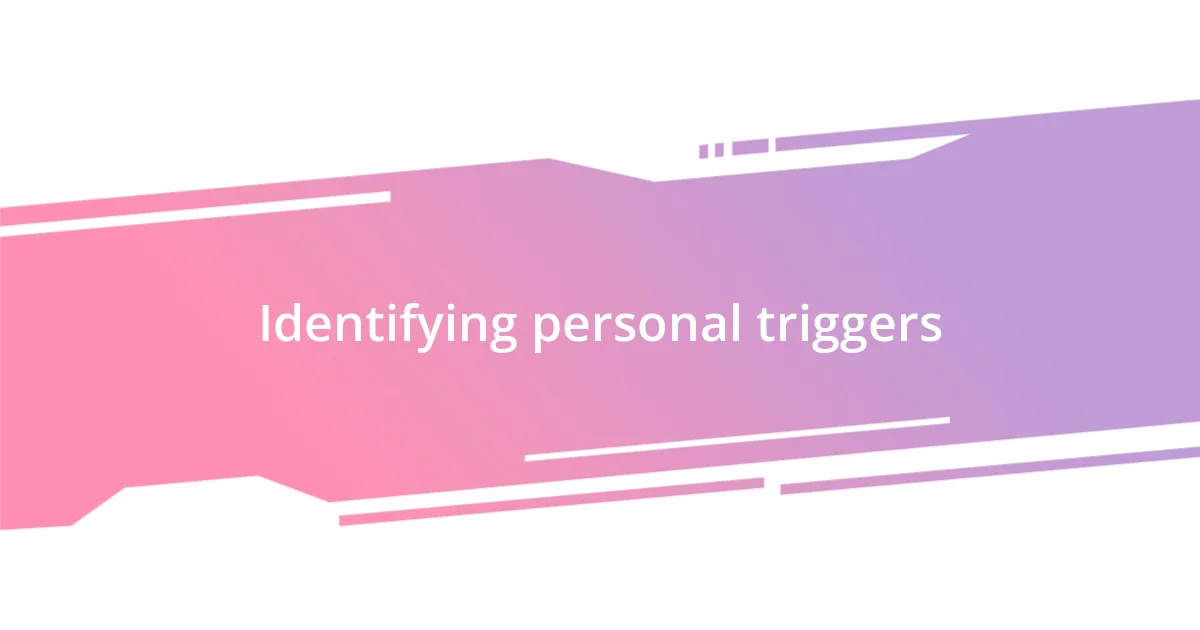
Identifying personal triggers
Identifying personal triggers can illuminate the paths that lead to writer’s block. For me, it often links back to times when I’m exhausted or overwhelmed by life’s responsibilities. Recently, after a particularly grueling week at work, I sat down to write but found myself staring blankly at my screen. It was in that moment I recognized my fatigue was a significant roadblock. Have you ever noticed how your physical state impacts your creative flow?
Additionally, environmental factors play a huge role in my writing process. I used to overlook how the clutter around me affected my focus until one weekend I decided to declutter my workspace. The difference was remarkable! Suddenly, words began flowing effortlessly, almost as if clearing the space lifted a weight off my mind. Have you considered how your surroundings influence your creativity?
Finally, I’ve learned that certain emotional states can act as triggers leading me toward a block. For instance, when I begin to doubt my abilities, it manifests as a mental block that feels heavy and suffocating. Each time I experience this, I try journaling my feelings to process them. It’s become a vital exercise in recognizing when I’m veering toward that familiar feeling of creative paralysis.
| Trigger Type | Personal Experience |
|---|---|
| Physical Exhaustion | Realized after a long work week made writing impossible. |
| Environmental Clutter | Decluttering my workspace helped restore my creativity. |
| Emotional Doubt | Journaling helps me process my feelings during these blocks. |
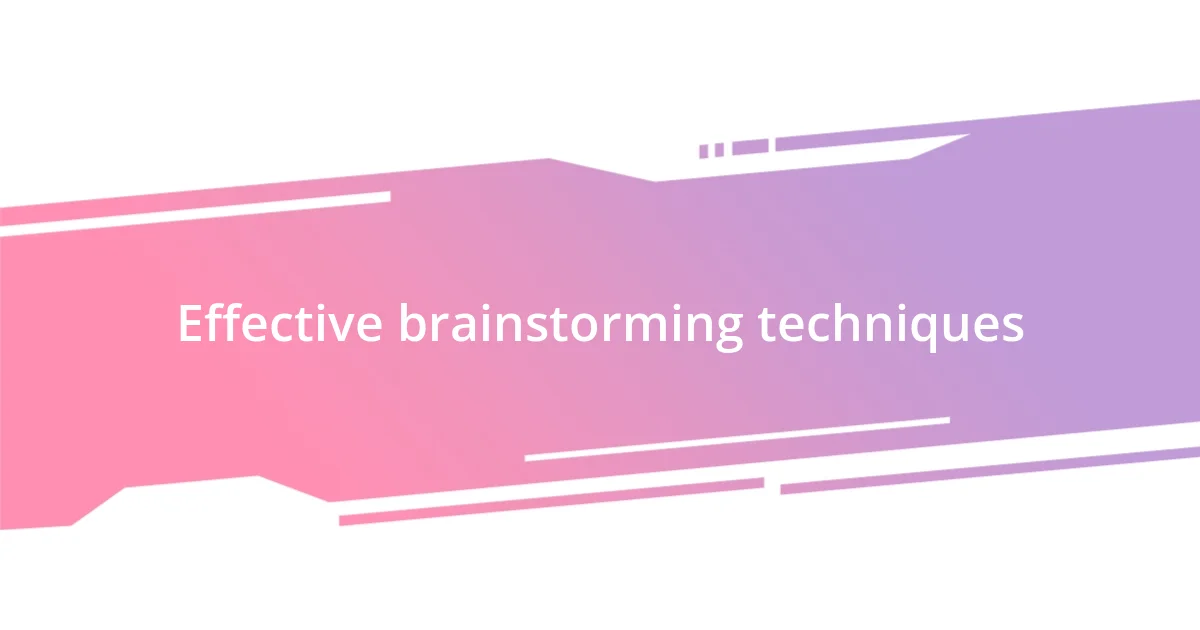
Effective brainstorming techniques

Effective brainstorming techniques
Diving into brainstorming can feel daunting, but I’ve found that approaching it with a playful mindset changes everything. One memorable day, I took a walk in the park, letting my thoughts wander freely. With each step, ideas began blossoming like flowers. I realized that breaking away from a traditional desk setting can ignite creativity in unexpected ways. What about you—when was the last time you stepped outside to let your imagination roam?
- Mind Mapping: Create a visual representation of ideas, connecting related thoughts to spark new ones.
- Freewriting: Set a timer for 10 minutes and write whatever comes to mind without worrying about grammar or structure.
- Word Association: Pick a random word and jot down everything that comes to mind; you’ll be surprised by the connections you make.
Additionally, involving others can inject fresh energy into the brainstorming process. I recall a lively evening spent with a close friend, bouncing ideas back and forth over coffee. Our conversation sparked a wave of creativity that simply wouldn’t have happened alone. Have you thought about the power of collaboration? Sharing ideas in a casual setting can create magic!
- Group Sessions: Gather friends or colleagues for a brainstorming workshop; the diverse perspectives can yield rich ideas.
- Role Play: Assume different perspectives during brainstorming to expand your creative thinking.
- Feedback Loop: Present your ideas to a trusted person to gain constructive feedback and different viewpoints.
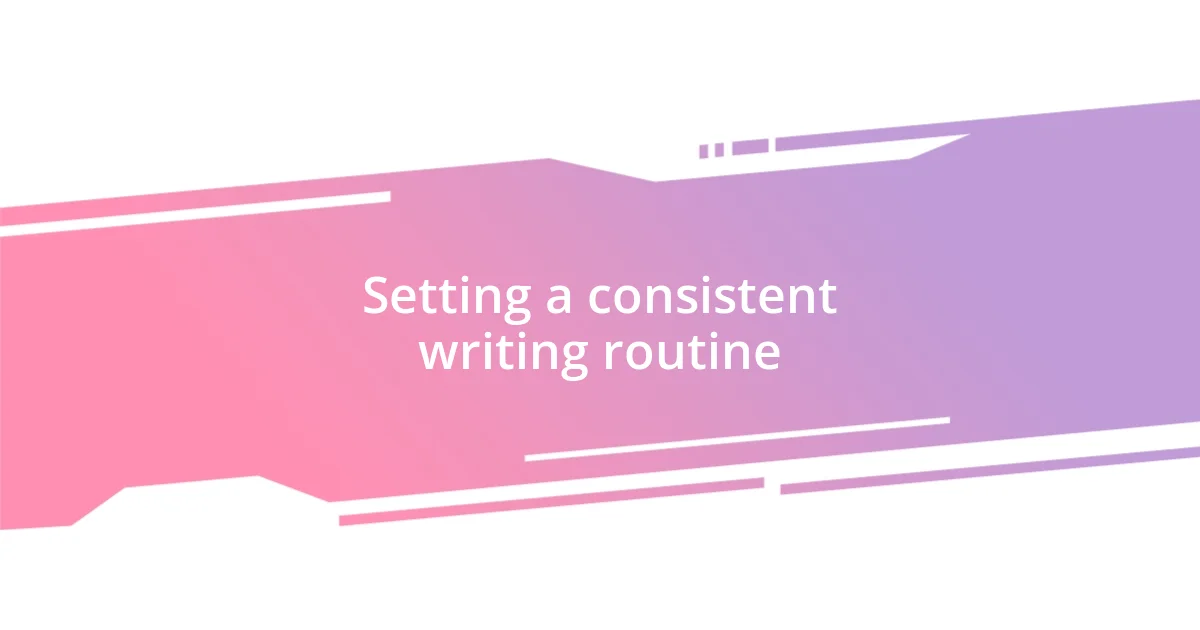
Setting a consistent writing routine
Establishing a consistent writing routine has been a game changer for me. I remember the early days when I would write only when inspired, which led to frantic bursts of creativity followed by long stretches of nothingness. Now, I sit down every morning with my coffee—no exceptions. It’s like clockwork, and I’ve found that this reliability takes the pressure off. Have you considered how structuring your time could set the stage for creativity?
There’s something magical about knowing when to write, and it helps me ease into the process. I often pick a specific spot, my favorite cozy chair with warm lighting, which signals my brain that it’s time to create. Initially, it felt forced, but soon it became a comforting ritual. With each session, I’ve found my thoughts flow more freely. Have you ever thought about creating a specific environment that fosters your creativity?
When I reflect on my journey, I see the importance of treating writing like a job, even if it’s my passion. I’ve faced days filled with distractions, but committing to my schedule has built a habit that now feels natural. In fact, keeping a journal specifically for tracking my writing hours has not only improved my output but has also heightened my awareness of my creative cycles. Have you tracked your writing activity to identify patterns in your routine?
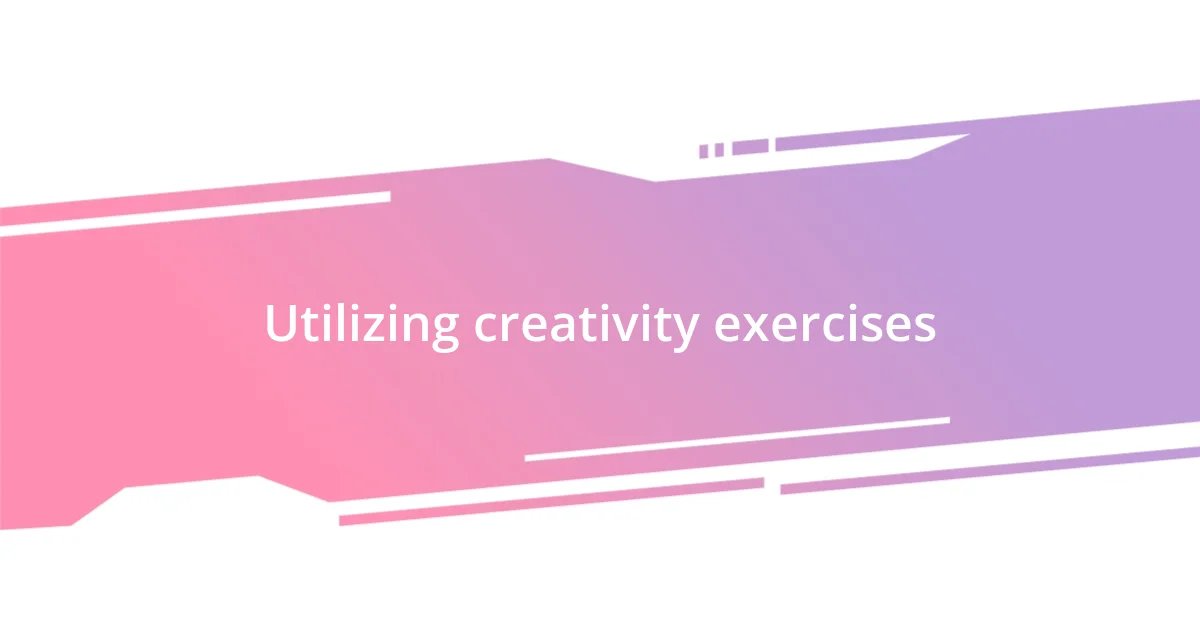
Utilizing creativity exercises
Utilizing creativity exercises can truly break down the barriers that writer’s block creates. One exercise I love is mind mapping, where I jot down a central idea and then branch out with related thoughts. It’s fascinating to see how one spark can lead to countless others. Have you ever tried this? I remember creating a mind map during a particularly frustrating week, and it felt like a roadmap opening up new paths and possibilities in my writing.
Freewriting is another activity that has changed the way I approach my creative process. Setting a timer and letting my thoughts spill onto the page without worrying about grammar feels liberating. Just the other day, I filled a page with random ideas for characters that turned into an entire short story! I often find that the more I freewrite, the more I uncover aspects of my writing I hadn’t even considered. Do you allow yourself to write without restrictions?
Word association is something I often do when I feel creatively stagnant. A few weeks ago, I chose the word “ocean” as a starting point. Within minutes, I had connected it to family memories, dreams of travel, and even themes of longing. This simple exercise became a gateway to a new piece of writing. Have you discovered how one word can lead to a cascade of thoughts? When I reflect on these exercises, their power in transforming my writing process is undeniable.
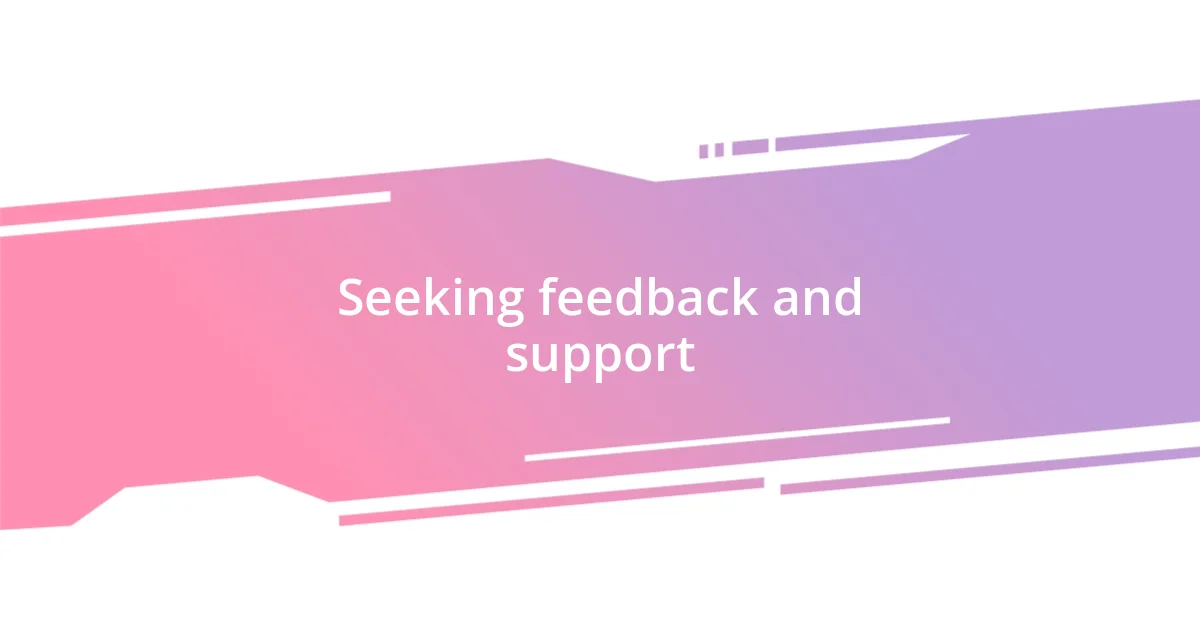
Seeking feedback and support
When I found myself stuck in my writing, tapping into the wisdom of others made a huge difference. I reached out to a close friend who’s also a writer; her perspective helped me see my work through a different lens. Sometimes, just talking about my struggles aloud provides clarity I didn’t know I needed. Have you ever felt that sharing your challenges can lighten the load?
Support groups and writing communities have been invaluable in my journey as well. Attending a local workshop, I was surprised at how sharing my drafts brought feedback that ignited fresh ideas. Constructive criticism from fellow writers can feel daunting, but it’s a crucial part of growth. I’ve learned that every critique offers a chance to refine my voice—has a supportive community helped you overcome your own hurdles?
Even online, I’ve discovered that forums and social media groups are filled with likeminded individuals eager to exchange thoughts and encouragement. Once, after posting a snippet of my work, I received a flood of suggestions that opened my eyes to new techniques. Engaging in these discussions not only recharged my creativity but also reminded me I’m not alone in this journey. Have you reached out to others for inspiration?
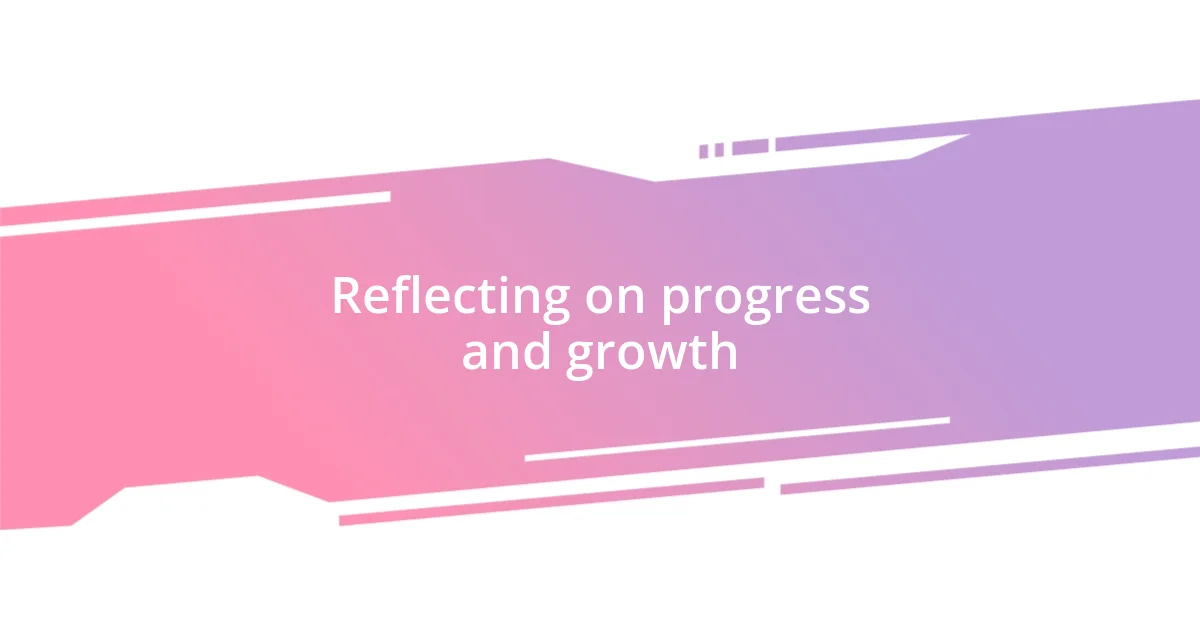
Reflecting on progress and growth
Reflecting on my journey through writer’s block has revealed just how much I’ve grown. There were times I felt utterly defeated, staring at a blank page for hours. Yet, each moment of frustration brought valuable lessons. For instance, I remember that one winter afternoon when I finally let go of my perfectionism and allowed myself to embrace the messy process of writing. It was liberating, and it marked a turning point in my creative journey.
I’ve noticed that as I’ve embraced feedback and experimentation, my confidence has soared. I used to shy away from sharing my drafts, fearing judgment, but now I view feedback as an essential tool for growth. Recently, during a workshop, I shared a piece I had reworked multiple times. The applause and constructive critiques stirred a sense of pride in me I’d never felt before. Have you experienced that exhilarating feeling when someone appreciates your work?
Every time I look back, I see how each setback was actually a stepping stone. There was that summer I struggled with plot development and thought about giving up. Instead, I chose to dig deep and question why I felt stuck. Ultimately, this reflection allowed me to tap into my emotional state and enrich my characters with more profound experiences. What if I hadn’t persevered? That exploration transformed my writing in ways I could have never predicted.












